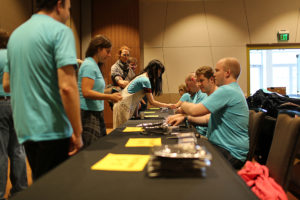Handling errors is canceling operations--Andrzej Krzemieński
Understand why it is done that way.
Handling errors is canceling operations
by Andrzej Krzemieński
From the article:
I actually covered this topic before, in this post, but given my recent experience I feel it needs reiterating and a bit of restructuring. It boils down to the observation that any error handling I have encountered — be it error codes, errno, exceptions, error monad — is about canceling operations that depend, directly or indirectly, on the function that reported failure. This has some consequences on how we look at our program flow and what principles we should follow when responding to failures in our programs...

 Will you answer?
Will you answer? The Standard C++ Foundation's second annual global C++ developer survey is now open. As the name suggests, it's a one-pager:
The Standard C++ Foundation's second annual global C++ developer survey is now open. As the name suggests, it's a one-pager: